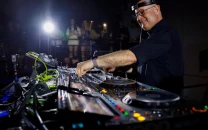Pashtun singers: Tunes of resistance
Pashtun singers hope to defy militancy and preach harmony through music.

The plains of Dera Ismail Khan sit at the gateway to South Waziristan, a militant stronghold that has often spewed violence into the settled district in the form of radical Islamism and Shia-Sunni rivalry. This has sent many local singers and musicians packing, and they have either wound up their business or left the country. But a few, like Naeemullah, the visually impaired 19-year-old, have stuck around and still practice their art.
“A couple of years ago, armed militants attacked us while we were performing at a wedding in Pakka Malana village in DI Khan,” he recalls. “We fled the scene while the hosts were badly beaten by the extremists.”
The young Saraiki artist started learning singing eight years ago as part of his education at a local government institute for the blind, and now performs alongside five other youngsters, all blind or visually impaired, hailing from different villages of Dera Ismail Khan. The band mixes modern and folk Pashto and Saraiki songs. They often perform at weddings, and once even the district administration officials of Dera Ismail Khan invited them to a musical event.

Visually impaired Sami Naeemullah sings with his bandmates with similar diasabilities. PHOTO: HAMID HUSSAIN
“We are singing to promote the message of peace and love as there is violence all around, and music is one of the ways to promote happiness in our broken society,” he says.
It may not be surprising, after all, that armed extremists are more of a challenge to his passion than his physical disability. When they forced musicians to abandon their profession, and sport beards and veils instead, the centuries-old Pashtun traditions saw a regression. The murder of Ghazala Javed in 2012, a famous Pashto female singer, sent shock waves across the Pashtun community, forcing other singers to reconsider their line of work. In the aftermath of the incident, many singers, including Haroon Bacha, Shehenshah Bacha, Nazia Iqbal, Sardar Yusafzai, Bushra aka Shazia from Swat, Wazir Khan Afridi, Sarfaraz Khan and Spogami were also either threatened or attacked.
Wazir Khan Afridi, a Pashto folk singer from Bara tehsil of Khyber Agency, says he has been kidnapped thrice and was released on the condition that he would quit singing. But Afridi remains adamant in his pursuit: “Music is part of our culture, society. How can we detach ourselves from it?”
There are some other singers who have persisted against the odds. Sarfaraz Khan, a mainstream Pashto singer from the Khyber Agency, went into hiding for almost a year following threats from militants, but is now back in business. His work, however, is not as thriving as it used to be; where he would successfully produce an album every three months, he now only manages to scrape out one every year due to fear. “Singers through songs can bring great positive change in the thinking of the people and that is what extremists worry about,” he says.
The director of the Bacha Khan Trust Foundation and author of The Militants Discourse, Khadim Hussain, agrees that religious extremists attack Pashto singers, artists and musicians because they promote harmony and peace in society, while extremism flourishes in chaos and anarchy. He believes the government can play a strong role in promoting art as a counter-narrative to the extremist’s harsh interpretation of life.
The government’s role, so far, has been counter-productive though. Nearly two years ago, the Swat district administration ordered all music shops to close down immediately as they were thought to be promoting obscenity. Usman Oasyar, head of the Swasto Art and Culture Association, filed a petition against it on July 16, 2012, following which the ban was lifted. “It is cultural legacies that live forever and not weapons and armies,” he says. “If there are press clubs and other associations, then why not art and culture associations at every district level?”
The circumstances may not be promising but hopes are high as young singers from educated families continue to pursue this field. Singer Gul Panara, who is a student at the Peshawar University, renowned singer Fayaz Kheshgi, who is a former union council nazim and belongs to the influential Kheshgi family, and Ahmed Khan, famed for his Pashto song “Rasha pa naz rasha” and who recently completed his Bachelors in business administration from Cecos University, Peshawar, are just some of the examples. Armed with nothing but their melodies, all these artists want is to strike the right chords in their region’s history.
Hamid Hussain is an Islamabad-based journalist. He tweets @Hamidlawangeen
Published in The Express Tribune, Sunday Magazine, July 20th, 2014.



















COMMENTS
Comments are moderated and generally will be posted if they are on-topic and not abusive.
For more information, please see our Comments FAQ